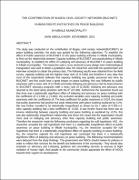The Contribution of Bugisu Civil Society Network (BUCINET) Human Rights Initiatives on Peace Building in Mbale Municipality
Abstract
The study was conducted on the contribution of Bugisu civil society network(BUCINET) on peace building activities, the study was guided by the following objectives: To establish the effect of Public awareness of BUCINET on the peace building activities in Mbale municipality, to find out the relationship between Capacity building of BUCINET and peacebuilding in Mbale municipality, to establish the effect of Lobbying and advocacy of BUCINET on peace building in Mbale municipality. The researcher used a cross sectional survey design were methodological triangulation was used to obtain a qualitative data, the researcher used both the questionnaire and interview schedule to obtain the primary data. The following results were obtained from the field survey: capacity building had the highest mean rank of (2.5190) and therefore it was clear that most of the respondents believed that capacity building was greatly perceived and done by BUCINET and this could have a great impact on peace building, this was followed by public awareness with a mean rank of (2.2626) and lastly lobbying and advocacy had the least presence in BUCINET advocacy programs with a mean rank of (2.2626). lobbying and advocacy was returned as the stand alone predictor with the R2 of 0.881, furthermore the researcher found out that there was a statistically significant effect of lobbying and advocacy on peace building with the coefficient of r( 0.939, p ( 0.000). the excluded variables were capacity building and public awareness with the coefficients of: The beta coefficient for public awareness is 0.024, this meant that public awareness had positive but weak relationship with peace building explained by 3.2%, this was further revealed to be statistically insignificant as shown by the t value of 0.391<+2. Also capacity building had a beta coefficient of -0.030, it was further found that there was an inverse relationship between capacity building and peace building as explained by -8.2%, this was also statistically insignificant relationship and hence this meant that the organization should more duel on lobbying and advocacy other than capacity building and public awareness. Therefore the researcher made the following conclusions regarding the null hypothesis: H01: the researcher accepted the null hypothesis that there is a statistically insignificant effect of public awareness on peace building in Mbale municipality. H02: the researcher accepted the null hypothesis that there is a statistically insignificant effect of capacity building on peace building. H03: the researcher rejected the null hypothesis and concluded that there is a statistically significant effect of lobbying and advocacy on peace building. The following recommendations were deduced from the study findings: The government and NGOs should review its policies in order to reflect their services for the benefit and betterment of the community. They should also emphasis on advocacy and Lobbying, guidance and counselling services as avenues to fight violation of human right. And people in the community should appreciate the effort of NGOs towards their support on development.
Collections
- Research Papers [6]

